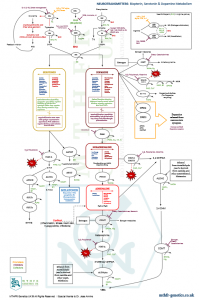Whether you ordered just our DNA test, or the Gene Variant Report only, your original purchase also covered free updates. This includes access to our growing library of educational content and articles. This space is reserved for content developed as part of your free updates. Whenever a new article appears in this area, you will be notified via email.
Author: Lifestyle Genomics Research Centre
Blood Sugar
Whether you ordered just our DNA test, or the Gene Variant Report only, your original purchase also covered free updates. This includes access to our growing library of educational content and articles. This space is reserved for content developed as part of your free updates. Whenever a new article appears in this area, you will be notified via email.
Ketogenic Diets
Whether you ordered just our DNA test, or the Gene Variant Report only, your original purchase also covered free updates. This includes access to our growing library of educational content and articles. This space is reserved for content developed as part of your free updates. Whenever a new article appears in this area, you will be notified via email.
Coffee Consumption & Caffeine Response
Whether you ordered just our DNA test, or the Gene Variant Report only, your original purchase also covered free updates. This includes access to our growing library of educational content and articles. This space is reserved for content developed as part of your free updates. Whenever a new article appears in this area, you will be notified via email.
Candida Albicans
As our Library of articles grows, we will be adding more articles relevant to the categories listed in your report.
Whether you ordered just our DNA test, or the Gene Variant Report only, your original purchase also covered free updates. This includes access to our growing library of educational content and articles. This space is reserved for content developed as part of your free updates. Whenever a new article appears in this area, you will be notified via email.
rs9282861
The C allele is associated with:
- C= increased activity
- The risk allele ‘C’ of the SNP rs9282861 or G638A in the SULT1A1 gene is associated with a poor response to tamoxifen, a chemotherapeutic drug used to treat breast cancer. It is thought that SULT1A1 activity is increased in those carrying the ‘C’ allele meaning that tamoxifen is targeted for degradation more rapidly. Although conflicting studies have shown no effect
The fact that the C allele of SULT1A1 leads to increased activity may explain the findings of several other studies which described elevated gastrointestinal cancer risk in those carrying the ‘C’ allele who consumed a diet rich in raw red meat.
- https://www.ncbi.nlm.nih.gov/pubmed/8288252
- https://www.ncbi.nlm.nih.gov/pubmed/10720750
- https://www.ncbi.nlm.nih.gov/pubmed/11154739
- https://www.ncbi.nlm.nih.gov/pmc/articles/PMC3388009/
- https://www.ncbi.nlm.nih.gov/pubmed/12419790
- https://www.ncbi.nlm.nih.gov/pmc/articles/PMC2751598/
- https://www.ncbi.nlm.nih.gov/pubmed/14973106
- https://www.ncbi.nlm.nih.gov/pmc/articles/PMC4698595/
- https://www.ncbi.nlm.nih.gov/pmc/articles/PMC2121650/
Expression Control
| Increase Gene Activity Estrone (R) | Decrease Gene Activity THC (R) | Can Work Both Ways Ethanol (R) | |||
| Biochanin A | (R) | Progesterone | (R) | Phosphoadenosine Phosphosulfate | (R) |
| Hydroxytryptophol | (R) | Quercetin | (R) | Salicylamide | (R) |
| Corticosterone | (R) | Xanthohumol | (R) | Estrogen | (R) |
| Creosote | (R) | Dietary Fats | (R) | Gallic Acid | (R) |
| Adrenocorticotropin zinc | (R) | Lithium | (R) | Naringenin | (R) |
| Furfuryl alcohol | (R) | Ursodeoxycholic Acid | (R) | Sodium Chloride | (R R) |
| NADP | Cafestol | (R) | Genistein | (R) | |
| Catechol | (R) | Kahweol | (R) | Daidzein | (R) |
| Zinc Sulfate | (R) | Palm oil | (R) | Harmol | (R) |
| Ozone | (R) | Tauroursodeoxycholic acid | (R) | Pentachlorophenol | (R) |
| Caffeic acid | (R) | Vitamin C | (R) | Dopamine | (R) |
| Cholic Acid | (R) | Hyperoside | (R) , (R) | Dimethyl Sulfoxide | (R) |
| Zinc | (R) | Nimesulide | (R) | Mifepristone | (R) |
| Apigenin | (R) | Benzo(b)fluoranthene | (R) | 1-hydroxymethylpyrene | (R) , (R) |
| Ferulic acid | (R) | Lindane | (R) | 1-methylpyrene | (R) , (R) |
| Catechin | (R) | Ethinyl Estradiol | (R) | 6-hydroxymelatonin | (R) |
| Resveratrol | (R) | Clotrimazole | (R) | 2,6-dichloro-4-nitrophenol | (R R) |
| Chrysin | (R) | Gabapentin | (R) | 3-hydroxybenzo(a)pyrene | (R) |
| Pinocembrin | (R) | Cyclosporine | (R R) | 3,3′-diiodothyronine | (R) |
| Valproic Acid | (R) | Phenobarbital | (R) | Anthra(1,9-cd)pyrazol-6(2H)-one | (R) |
| Indomethacin | (R) | Carbamazepine | (R) | 4-biphenylamine | (R) |
| Isoproterenol | (R) | Phenytoin | (R R) | 4-nitrophenol | (R R) |
| Ketamine | (R) | Felbamate | (R) | Methanol | (R) |
| Oxaliplatin | (R) | 9,10-Dimethyl-1,2-benzanthracene | (R) | Mefenamic Acid | (R) |
| Methamphetamine | (R) | 1-(2-trifluoromethoxyphenyl)-2-nitroethanone | (R) | Pirinixic acid | (R) |
| Dexamethasone | (R) | 3-xylene | (R) | Octachlorostyrene | (R) |
| Arsenic trioxide | (R) | 2,4,5,2′,4′,5′-hexachlorobiphenyl | (R) | Pentabrominated diphenyl ether 100 | (R) |
| Scopolamine Hydrobromide | (R) | 3,4,5,3′,4′-pentachlorobiphenyl | (R R) | Estrogens, Catechol | (R) |
| Diethylstilbestrol | (R) | Indeno(1,2,3-cd)pyrene | (R) | Halogenated Diphenyl Ethers | (R) |
| Lidocaine | (R) | AZM551248 | (R) | SB 203580 | (R) |
| Ropivacaine | (R) | Gentamicins | (R) | Triiodothyronine, Reverse | (R) |
| Morphine | (R) | Meclofenamic Acid | (R) | Chlorophenols | (R) |
| Sodium arsenate | (R) | Methapyrilene | (R R) | Cycloheximide | (R) |
| 1-Methyl-3-isobutylxanthine | (R) | N-nitrosomorpholine | (R) | Dactinomycin | (R) |
| 4-octylphenol | (R) | Piroxicam | (R) | Dimethylformamide | (R) |
| 2-methylfuran | (R) | Pregnenolone Carbonitrile | (R R) | Acetonitrile | (R) |
| Benzo(a)pyrene-7,8-dione | (R) | Trinitrobenzenesulfonic Acid | (R) | Tetrabromobisphenol A | (R) |
| 4-hydroxybenzoic acid | (R) | Bexarotene | (R) | ||
| 3,4-dichlorinated biphenyl | (R) | Bismuth tripotassium dicitrate | (R) | ||
| 1-methoxy-3-indolylmethylglucosinolate | (R) | Dechlorane plus | (R) | ||
| 1,4-bis(2-(3,5-dichloropyridyloxy))benzene | (R) | Diethyl maleate | (R) | ||
| 2-sulfoxymethylfuran | (R) | Pyrazole | (R) | ||
| 7-hydroxycoumarin | (R) | Titanium dioxide | (R) | ||
| 2,5-dihydroxybenzoic acid | (R) | Trimellitic anhydride | (R) | ||
| 2-amino-1-methyl-6-(4-hydroxyphenyl)imidazo(4,5-b)pyridine | (R) | Valdecoxib | (R) | ||
| 4-coumaric acid | (R) | Heptachlor | (R) | ||
| 5-hydroxyindole | (R) | Naphthalene | (R) | ||
| 2-amino-3-methyl-9H-pyrido(2,3-b)indole | (R) , (R) | Carbon Tetrachloride | (R) | ||
| 2-hydroxyamino-1-methyl-6-phenylimidazo(4,5-b)pyridine | (R) , (R) | Diethylhexyl Phthalate | (R) | ||
| 8-azaadenine | (R) , (R) | Chlorodiphenyl (54% Chlorine) | (R) | ||
| (6-(4-(2-piperidin-1-ylethoxy)phenyl))-3-pyridin-4-ylpyrazolo(1,5-a)pyrimidine | (R) | Diethylnitrosamine | (R) | ||
| 4-cresol | (R) | Cylindrospermopsin | (R) | ||
| 3,3′-dichlorobiphenyl | (R) | Pantogab | (R) | ||
| 4-chlorobiphenyl | (R) | Furan | (R) | ||
| 1-naphthol | (R) | Kojic acid | (R) | ||
| 2-Naphthylamine | (R) | Aflatoxin B1 | (R) | ||
| 4-nonylphenol | (R) | Perfluorodecanoic acid | (R) | ||
| 2-naphthol | (R) | Diuron | (R) | ||
| Neurotransmitter Agents | (R) | Perfluorooctanoic acid | (R R R R) | ||
| Chloroprene | (R) | Fenbuconazole | (R) | ||
| Phenols | (R) | Bisphenol A | (R) , (R) | ||
| Topotecan | (R) | Cobaltous chloride | (R) | ||
| Panobinostat | (R) | ||||
| Carbonyl sulfide | (R) | ||||
| Trichostatin A | (R) | ||||
| C646 compound | (R) | ||||
| Ethyl Methanesulfonate | (R) | ||||
| GW 4064 | (R) | ||||
| Glycidamide | (R) | ||||
| ICG 001 | (R) | ||||
| Methyl Methanesulfonate | (R) | ||||
| P-Chloromercuribenzoic Acid | (R) | ||||
| Entinostat | (R) | ||||
| Beta-Naphthoflavone | (R) | ||||
| Rosiglitazone | (R) | ||||
| Phentolamine | (R) | ||||
| Nitrofen | (R) | ||||
| Methylcholanthrene | (R) | ||||
| Minoxidil | (R) | ||||
| Hymecromone | (R) | ||||
| Benzene | (R) | ||||
| Formaldehyde | (R) | ||||
| Parathion | (R) | ||||
| Hexachlorobenzene | (R) | ||||
| Lead acetate | (R) | ||||
| Sodium arsenite | (R) | ||||
| Uranyl Nitrate | (R) | ||||
| Mercuric bromide | (R) | ||||
| Phenylmercuric Acetate | (R) | ||||
| Desoxycorticosterone | (R) | ||||
| Serotonin | (R) | ||||
| Benzo(a)pyrene | (R) | ||||
| Ochratoxin A | (R) | ||||
| Pyrene | (R) , (R) | ||||
| Fipronil | (R) | ||||
| Propiconazole | (R) | ||||
| DEET | (R) | ||||
| Troglitazone | (R) |
Rs2282679
Parent Gene: GC
Minor Allele: G = 20%
Major Allele: T = 80%
The G allele is associated with:
- Lower Vitamin D levels (R).
- GG – even lower vitamin D levels. [PMID 20418485]
Expression Control
| Increase gene function | Decrease gene function |
Tretinoin (R)Potassium persulfate (R) Non Human Studies: Diclofenac (R)Doxorubicin (R)Genistein (R)N-nitrosomorpholine (R)Silicon Dioxide (R)Thioacetamide (R)Adrenocorticotropin zinc (R)Bleomycin (R) | Acetaminophen (R)Cyclosporine (R)Vehicle Emissions (R)(+)-JQ1 compound (R) Non Human Studies: Diethylnitrosamine (R)Pirinixic acid (R)Dimethylnitrosamine (R)Potassium Dichromate (R)Tacrolimus (R)Bexarotene (R)Bisphenol A (R)Caffeic acid phenethyl ester (R)Chromium nitrate (R)Cobaltous chloride (R)Methylmercury II (R)Nefazodone (R)Nimesulide (R)Ochratoxin A (R)Perfluorododecanoic acid (R)Potassium chromate(VI) (R)Retene (R)Titanium dioxide (R)Clofibrate (R) |


